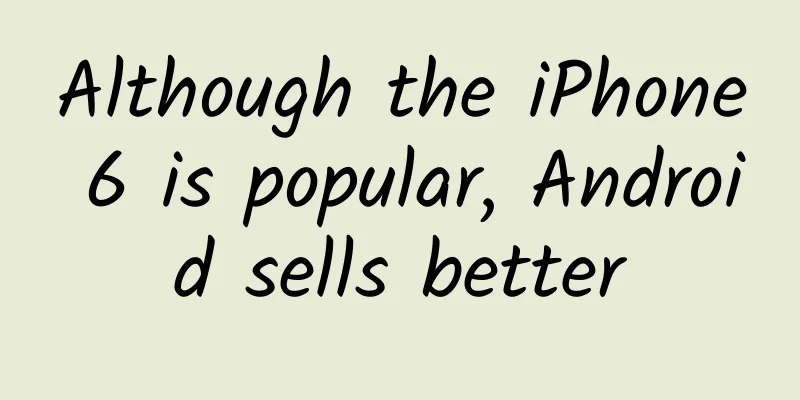Although the iPhone 6 is popular, Android sells better

|
In today's smartphone market, looking at market share data seems to have become a routine. Android is always No. 1, iOS is always No. 2, and the market share of other systems is constantly falling. The only thing to watch is whether iOS can regain some ground or lose some ground; or, even darker, how long it will take for BlackBerry to disappear from this world...
According to the 2014 Smartphone Market Report recently released by IDC, the global smartphone shipments exceeded 1.3 billion, and Android and iOS accounted for 96.3% of the total. The situation of "there are only two smartphone systems in the world" has not been shaken at all. In 2014, the outstanding sales of iPhone 6 and iPhone 6 Plus led Apple to break new records in market value, but iOS did not regain some territory. iOS shipped 192.7 million units, a year-on-year increase of 25.6%, but its market share was 14.8%, a slight decrease from 15.1% in the same period last year. As for Android, Samsung is still the leader, with its mobile phone shipments equal to the total shipments of the five mobile phone manufacturers behind it. However, compared with 2013, Samsung's mobile phone shipments in 2014 did not increase much. Therefore, Android, with a total of 1.059 billion units and a market share of 81.5%, a year-on-year increase of 32%, actually relies on the rapid growth of Asian manufacturers such as Huawei, Lenovo (Motorola), LG, Xiaomi and ZTE. Then let's look at those who are trying to survive in the cracks: Windows Phone shipments have also increased, but the increase is only 4.2%. The shipments of 34.9 million are a bit embarrassing compared to either of the two giants, and the market share is also shrinking. No wonder many platforms and applications say that their market share is too small to care about when mentioning Windows Phone. And this 4.2% growth is still dependent on the acquisition of Nokia by Microsoft and the launch of low-end Lumia models. According to the current cooperation situation, even if Windows 10 (mobile operating system) is released, the situation of Windows Phone will not change much. Let's take a look at BlackBerry with a sinister mentality: Even though it launched two models, Passbook and Classic, its market share has dropped sharply, leaving only 0.4%, which is essentially unchanged. It is a laggard that has not caught up with the overall growth trend. However, BlackBerry's CEO Chen Shouzong has made a bold statement that through these two mobile phones, the shipment volume will reach 10 million units in 2015, an increase of 72% over the 5.8 million units in 2014. Such a bold idea and courage may be matched by no one except Meizu in my country. Of course, unlike Meizu, there is no data to help BlackBerry prove this point, and there is only a market share that is increasingly likely to fall into the "others" category. |
<<: What is the difference between Baidu and Google?
>>: Microsoft brings Android Wear apps to Android phones
Recommend
The opening show of the Magic Factory: reducing the burden and adding color to smart homes
At the just-concluded National People's Congr...
Short video operation: 8 tips for cover selection
When writing, we all understand that "well b...
How to divert private domain traffic?
"Private domain" has almost become an u...
If you can achieve this level of information flow advertising optimization, is it possible to earn a monthly salary of 30,000?
I have read some articles on the market, all of w...
The history of the development of Russian pistols, from the famous "Makarov" to the "Lebedev"
The press office of Russia's Kalashnikov Grou...
WeChat has been significantly updated with three new features. Netizens: What’s the difference between this and QQ?
WeChat upgraded again just before New Year's ...
Typhoon Siam is approaching! It will make landfall today
Typhoon Siam, the third typhoon this year, is app...
Google and Fiat Chrysler team up to launch Android-based car system
According to Fortune, Google and Fiat Chrysler Au...
The pesticide residues in vegetables purchased from large e-commerce platforms also exceed the standard? What should I do?|Environmental Trumpet
Hello everyone, this is the first issue of the En...
Operation and promotion: How to use the AARRR model to attract 150,000 fans in 10 days at 0 cost?
I believe that many people engaged in operations ...
Summary of common configurations of Android gradle
This article summarizes the common configurations...
Will Apple build a panel factory to become the "barbarian at the gate" of the TV industry?
Perhaps the saying "the early bird catches t...
"The Best Celebrity" is out of the circle! How do Internet celebrities attract attention?
This year, the comedy film "Hot Man" ha...
Is this the real "water ball" in the universe? With more than 10% of water, it can "kill" the earth in seconds!
Author: Huang Xianghong Duan Yuechu In the depths...
Brand Operations: How do brands influence consumer behavior?
Recently, all the major subway lines and bus stop...









